The Correlation Among Reading Habits, Reading Motivation, and Reading Comprehension of The Eleventh Grade Students of SMA Negeri 10 Palembang
DOI:
https://doi.org/10.61994/jee.v1i1.59Keywords:
Correlation Analysis, Reading Habits, Reading Motivation, Reading ComprehensionAbstract
The effect of comprehension is determined not only by whether or not the text makes sense but also by the information it contains. The purpose of this research was to determine whether or not there was a correlation among class XI students' reading habits, reading motivation, and reading comprehension at SMA Negeri 10 Palembang. 130 students from classes XI MIA 5, XI MIA 6, and XI MIA 7 were chosen using the purposive sampling technique. The correlational method applies to this study. Questionnaires and tests have been data collection instruments. To analyze the data, the writer used Kolmogorov-Smirnov normality testing, SEM-PLS for correlation analysis, with SmartPLS version 3.2.9. The latent variable correlation results for the significance of reading habits and reading comprehension in students show the correlation value (0,989) was higher than r-table (0,172). This means that the significant value of correlation was included in the very high category, and the results of the latent variable correlation on the significance of students' reading motivation and reading comprehension show that the correlation value (1,000) was higher than the r-table (0,172). This means that the significant value of correlation was included in the very high category. The correlation coefficient was found to be significant. It also implies there was a statistically significant correlation among their reading habits, reading motivation, and reading comprehension. The null hypothesis (Ho) was rejected, and the alternative hypothesis (Ha) was accepted, as determined by the writer. In conclusion, this result is explained by the fact that there was a significant relationship among reading habits, reading motivation, and reading comprehension.
References
Bonvillain, N. (2019). Language, culture, and communication: The meaning of messages. Rowman & Littlefield.
Burns, A., & Siegel, J. (2018). Teaching the four language skills: Themes and issues. International perspectives on teaching the four skills in ELT: Listening, speaking, reading, writing, 1-17.
Cochrane, L. (2012). Julie S. Amberg & Deborah J. Vause, American English: History, structure, and usage. Cambridge: Cambridge University Press, 2009.Language in Society,41(1), 139-140. doi:10.1017/S004740451100100X.
Creswell J. W. & Guetterman T. C. (2019). Educational research: planning conducting and evaluating quantitative and qualitative research (6th ed.). Pearson Education.
Duke, N. K. (2001). Building comprehension through explicit teaching of comprehension strategies. Michigan State University.
Eun-kyung, L. & Jung-im, Y. (2016). Relationship between Motivation and Reading Comprehension. Journal of the Humanities.
Fajardo, I., Ávila, V., Ferrer, A., Tavares, G., Gómez, M., & Hernández, A. (2014). Easy‐to‐read texts for students with intellectual disability: linguistic factors affecting comprehension. Journal of applied research in intellectual disabilities, 27(3), 212-225.
Fajr, A. D. L. R. A. (2022). The Correlation Between The Students’ Reading Habit And Reading Comprehension At The Third Grade English Language Education Of FKIP, Universitas Islam Riau (Doctoral dissertation, Universitas Islam Riau).
Fraenkel, J. R., Wallen, N. E., & Hyun, H. H. (2012). How to design and evaluate research in education (8th ed.). New York: McGraw-Hill.
Ganie, R., Deliana, & Rangkuti, R. (2019). Reading comprehension problems on English texts faced by high school students in Medan. KnE Social Sciences, 684–694. https://doi.org/10.18502/kss.v3i19.4896
Habibah, H. (2016). The Correlation Between Reading Fluency And Reading Comprehension Achievement Of The Eighth Grade Students Of Mts Paradigma Palembang (Skripsi) (Doctoral dissertation, UIN Raden Fatah Palembang).
Harmer, J. (2001). The Practice of English Language Teaching (3rd ed.). Harlow: Longman.
Huettig, F., & Pickering, M. J. (2019). Literacy advantages beyond reading: Prediction of spoken language. Trends in cognitive sciences, 23(6), 464-475.
Ikhsan, N., Ali, R., & Suryani, H. (2018). The Correlation Between Students’motivation And Reading Comprehension Of Eighth Grade Students At State Junior High School N 4 Muaro Jambi (Doctoral dissertation, UIN Sulthan Thaha Saifuddin Jambi).
Jack, S. (2008). The habit of reading and its advantages-why you should develops Habit of Regular Reading. International Journal Education Science.
Janthong, J., & Sripetpun, W. (2010). English reading comprehension and reading habit improvement: Use of questioning technique. In The 2nd International Conference on Humanities and Social Sciences (Vol. 9, No. 1, pp. 1-31). http://fs.libarts.psu.ac.th/research/conference/proceedings-2/3pdf/009.pdf
Johnson, R. B., & Christensen, L. (2019). Educational research: Quantitative, qualitative, and mixed approaches (7th ed). Sage publications.
Klingner, J. K., Vaughn, S., & Boardman, A. (2007). Teaching reading comprehension to students with learning difficulties. Guilford Press.
Knoll, C. L. (2000). The relationship between motivation and reading comprehension (Magister’s Thesis) Grand Valley State University. https://scholarworks.gvsu.edu/cgi/viewcontent.cgi?article=1525&context=theses.
Kočiský, T., Schwarz, J., Blunsom, P., Dyer, C., Hermann, K. M., Melis, G., & Grefenstette, E. (2018). The narrativeqa reading comprehension challenge. Transactions of the Association for Computational Linguistics, 6, 317-328.
Lotherington, H. (2004). What Four Skills? Redefining Language and Literacy Standards for ELT in the Digital Era. TESL Canada Journal, 22, 64-77.
Mamajanova, G., & Artikova, B. (2022). Development of Reading and Comprehension Skills on Specialty. Education Science and Innovative Ideas in the World, 13(1), 139-14.
Müller-Spitzer, C., Vázquez, M. J. D., Curcio, M. N., Dias, I. M. S., & Wolfer, S. (2018). Correct hypotheses and careful reading are essential: results of an observational study on learners using online language resources. Lexikos, 28, 287-315.
Richards, J.C., & Schmidt, R.W. (2011). Longman Dictionary of Language Teaching and Applied Linguistics (4th ed.). Routledge. https://doi.org/10.4324/9781315833835.
Samrotul, M. (2014). The Relationship Between Students’ Reading Habit and Their Reading Comprehension (A Correlational Study At The Second Grade Students of SMA Dua Mei Ciputat). Jakarta: UIN Syarif Hidayatullah.
Wigfield, A., Gladstone, J. R., & Turci, L. (2016). Beyond cognition: Reading motivation and reading comprehension. Child development perspectives, 10(3), 190-195.
Downloads
Published
Issue
Section
License
Copyright (c) 2023 Andi Aditya, Fadhilah Dafa, Darmawan Budiyanto , M. Rasyid Ridho

This work is licensed under a Creative Commons Attribution-ShareAlike 4.0 International License.

Journal of English Education by https://jurnal.dokicti.org/index.php/JCSS/index
is licensed under a Creative Commons Attribution-ShareAlike 4.0 International Licensel
















